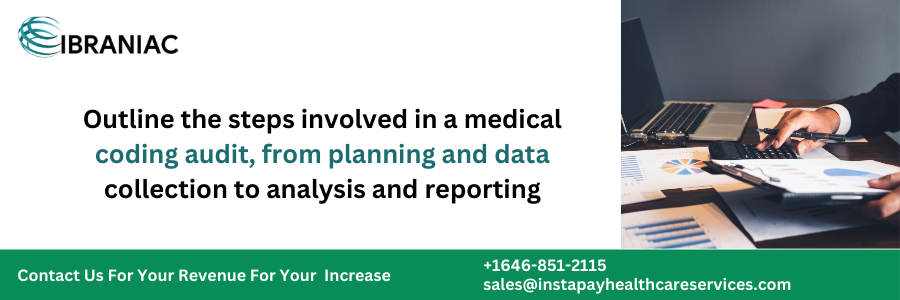
Outline the steps involved in a medical coding audit, from planning and data collection to analysis and reporting
by admin | May 13, 2024 | 0 comments,
1) Unveiling the Art of Medical Coding Audits :
In the problematic international of healthcare administration, medical coding audits services a cornerstone for ensuring accuracy, compliance, and most appropriate revenue cycle management. From meticulously making plans the audit to crunching statistics and offering insightful reviews, each step plays a pivotal role in retaining the integrity of healthcare coding methods. Let's delve into the comprehensive process of undertaking a medical coding audit.
2) Planning Phase: Setting the Stage for Success :
Defining Audit Objectives and Scope
Before embarking on a medical coding audit journey, it is imperative to establish clear goals and delineate the scope of the audit. This involves figuring out key focus areas together with compliance with coding guidelines, accuracy of code venture, and revenue optimization strategies.
Establishing Audit Criteria and Methodology
Crafting audit standards lays the basis for evaluating coding practices correctly. Whether it's specializing in particular code units, documentation requirements, or compliance standards, defining audit criteria ensures alignment with organizational dreams. Additionally, deciding on an appropriate audit technique—be it random sampling, targeted audits, or retrospective reviews—enhances the efficiency and effectiveness of the audit process.
3) Data Collection: Gathering Insights for Analysis :
Accessing Source Documents and Records
Central to the statistics collection phase is obtaining get entry to pertinent source files and clinical facts. This entails participating with various stakeholders, together with healthcare providers, coding experts, and compliance officers, you purchased comprehensive documentation reflective of patient encounters.
Leveraging Technology for Data Extraction
In the virtual age, harnessing the power of era streamlines information extraction methods, facilitating seamless get admission to electronic health facts (EHRs), coding databases, and billing structures. Automated gear and software solutions play a pivotal position in extracting relevant facts factors, optimizing performance, and mitigating manual errors.
4) Analysis: Decoding Patterns and Trends :
Conducting Thorough Code Reviews
The crux of a medical coding audit lies in scrutinizing coding practices with meticulous interest to element. Conducting complete code critiques entails reading person code assignments, documentation accuracy, modifier usage, and adherence to coding hints which includes ICD-10-CM, CPT, andHCPCS Level II.
5) Reporting: Transforming Insights into Actionable Intelligence :
Crafting Detailed Audit Reports
Effective verbal exchange of audit findings is paramount in using actionable insights and fostering non-stop improvement. Crafting distinct audit reviews includes summarizing key findings, quantifying compliance metrics, and imparting actionable recommendations for remediation and procedure enhancement.
Collaborating with Stakeholders for Remediation
Closing the loop at the audit procedure entails participating with stakeholders to cope with diagnosed deficiencies and put into effect corrective action plans. Whether it's supplying centered schooling and education for coding group of workers or refining documentation tactics, proactive remediation efforts are important for using sustainable compliance and revenue integrity.
6) Conclusion: Navigating the Path to Compliance and Excellence :
In conclusion, undertaking a medical coding audit contains a multifaceted adventure spanning meticulous planning, statistics series, evaluation, and reporting. By adhering to first-class practices, leveraging technology, and fostering a lifestyle of continuous improvement, healthcare agencies can navigate the complicated landscape of coding compliance with self belief and excellence.
Ready to elevate your medical coding practices? Contact Instapay Healthcare Services today at+1(646) 851-2115 or via email at sales@instapayhealthcareservices.com Let our experts streamline your coding audits and ensure compliance excellence. Unlock the power of precision with Instapay Healthcare Services.
Frequently Asked Questions (FAQs)
How frequently should medical coding audits be conducted?
Medical coding audits have to be carried out frequently to make sure ongoing compliance and sales integrity. Many healthcare groups choose quarterly or biannual audits to preserve vigilance and discover emerging trends.
What are the common challenges encountered during medical coding audits?
Some not unusual challenges include incomplete documentation, coding errors, evolving regulatory requirements, and aid constraints. Addressing those demanding situations requires a proactive approach, ongoing training, and leveraging era solutions.
How can healthcare organizations leverage audit findings to drive process improvement?
Audit findings function a catalyst for riding process improvement initiatives throughout numerous sides of healthcare operations. By enforcing focused education applications, refining documentation workflows, and optimizing coding procedures, agencies can decorate compliance and operational performance.
What role does technology play in streamlining the medical coding audit process?
Technology plays a pivotal function in streamlining records series, analysis, and reporting workflows. Automated audit gear, coding software, and data analytics answers allow healthcare organizations to behavior audits more efficiently, pick out developments, and mitigate compliance risks.
How can healthcare providers ensure compliance with coding guidelines and regulations?
Ensuring compliance with coding hints and guidelines calls for a multifaceted method encompassing education, training, ordinary audits, and proactive monitoring. By fostering a tradition of compliance and presenting ongoing aid to coding group of workers, companies can mitigate risks and uphold coding integrity.
What are the potential consequences of non-compliance in medical coding practices?
Non-compliance in medical coding practices could have a long way-attaining results, such as financial penalties, revenue loss, reputational damage, and legal ramifications. Proactive compliance measures and diligent auditing are critical for protecting organizational integrity and mitigating risks.